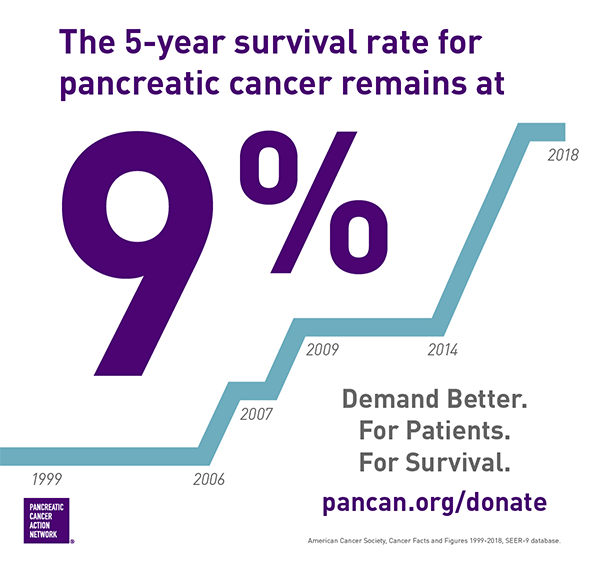
Today, the American Cancer Society (ACS) released its 2018 Cancer Facts & Figures, an annual report that analyzes cancer statistics and trends and provides predictions for the coming year.
 The report estimates that 55,440 Americans will be diagnosed with pancreatic cancer this year and that 44,330 will die from the disease.
The report estimates that 55,440 Americans will be diagnosed with pancreatic cancer this year and that 44,330 will die from the disease.
“That’s 152 mothers, daughters, fathers, sons, colleagues and friends who will hear the news every day in 2018, ‘You have pancreatic cancer,’” said Julie Fleshman, JD, MBA, president and CEO of the Pancreatic Cancer Action Network (PanCAN). “Our goal is that the doctor will then say, ‘And here are your options.’”
This year, the five-year survival rate for pancreatic cancer remains at 9 percent*, although the previous three years saw an increase in the rate reflecting much-needed progress to improve outcomes for patients facing this disease.
This progress is clearly not sufficient however, as pancreatic cancer remains on track to become the second leading cause of cancer-related death in the United States around 2020, based on widely cited research published by PanCAN.
Therefore, there is an urgent need for additional funding and support to improve outcomes and to help PanCAN reach its goal to double survival by 2020.
PanCAN is the only organization that attacks pancreatic cancer on all fronts: research, clinical initiatives, patient services and advocacy.
On the research side, there continues to be significant momentum toward improving treatment options, developing early detection tools, understanding risk factors and unlocking the biology of pancreatic tumors.
Beyond the research lab, all treatments that are available today were approved through a clinical trial. Participation in pancreatic cancer clinical trials will help to ensure that the five-year survival rate continues to increase. January is National Pancreatic Cancer Clinical Trials Awareness Month, so now is a key opportunity to emphasize the importance of trial participation for patients today and in the future. PanCAN strongly recommends clinical trials at diagnosis and during every treatment decision.
PanCAN can help match patients with clinical trials via its comprehensive, up-to-date database of all pancreatic cancer-specific trials in the United States. In addition, eligible patients can enroll in the organization’s Know Your Tumor® precision medicine service for molecular profiling to help determine the best, personalized treatment options for them, including clinical trials.
“While there is certainly progress being made in the fight against pancreatic cancer, the ACS Facts & Figures is an important reminder of the toll the disease is expected to take in the coming year,” added Fleshman. “But it’s also a chance to focus on all the opportunities to improve outcomes and extend lives for those facing pancreatic cancer in 2018 and beyond.”
We need your help to continue to offer critical patient services and clinical initiatives, to support and conduct innovative research and to raise much-needed awareness about pancreatic cancer.
*Rates are adjusted for normal life expectancy and are based on cases diagnosed in the SEER 9 areas from 2007 to 2013, followed through 2014.
















